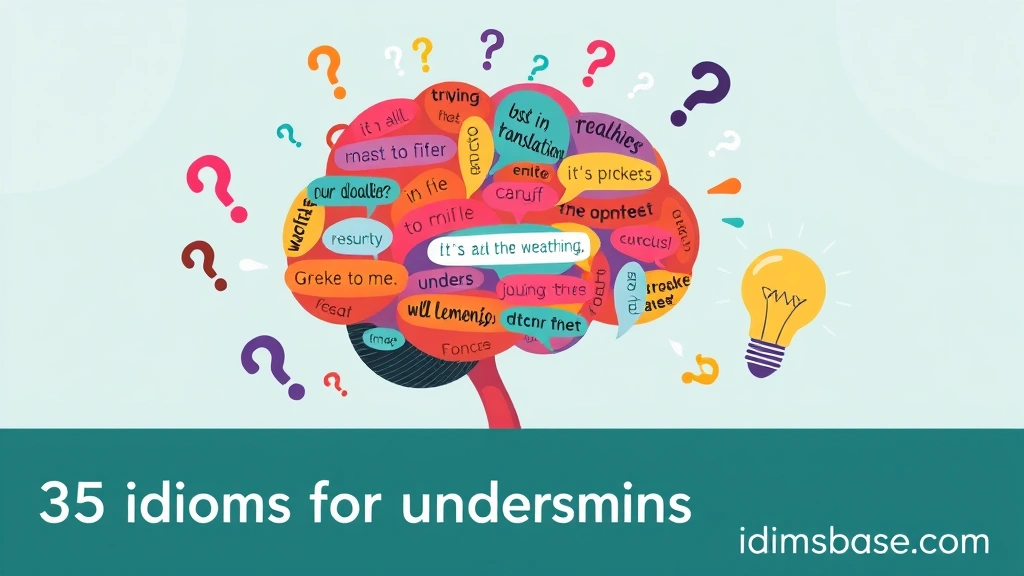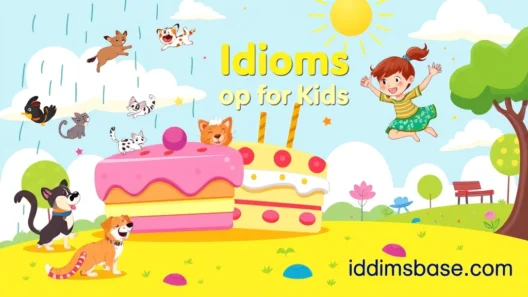Have you ever been in a conversation, and suddenly, it feels like everyone else is speaking a different language? You nod along, smile vaguely, but inside, your brain is doing a full-on "Does Not Compute" dance. It’s a universal feeling, isn't it? That moment when a concept just doesn't click, or someone's explanation goes right over your head.
Well, you're in good company! The English language, in its wonderfully quirky way, has cooked up a fantastic array of idioms to perfectly capture these moments of utter bewilderment. From the simple "I don't get it" to more colorful expressions, these phrases paint a vivid picture of confusion. Learning them isn't just fun; it also makes your English sound more natural and expressive. So, let’s dive into 35 awesome idioms for when things just aren’t making sense!
35 Idioms for Not Understanding
Here's your go-to list for those "Huh?" moments. Get ready to expand your vocabulary and perfectly articulate your confusion!
- It went over my head: This is a classic! It means you didn't understand something, usually because it was too difficult or complex.
- Example: "The professor's lecture on quantum physics completely went over my head."
- I don't get it: Simple, direct, and effective. You just don't understand.
- Example: "I don't get why they changed the rules now."
- It's Greek to me: This idiom means something is completely incomprehensible, as if written in a foreign language you don't know.
- Example: "This instruction manual for the new gadget is Greek to me."
- I can't make head or tail of it: You can't understand something at all; you can't figure out its meaning or purpose.
- Example: "I've read this contract three times, and I still can't make head or tail of it."
- I'm lost: You're confused and don't know what's happening or what to do next.
- Example: "Can you explain that again? I'm completely lost."
- I'm in the dark: You lack information or understanding about something important.
- Example: "They've been planning this surprise party, and I'm totally in the dark."
- It's all Greek to me: (Yes, it's so popular, it's worth repeating!) Still means utterly incomprehensible.
- Example: "When they started talking about blockchain, it was all Greek to me."
- I'm drawing a blank: You can't remember something or think of an answer.
- Example: "What was her name again? I'm drawing a blank."
- It doesn't ring a bell: Something doesn't sound familiar or doesn't trigger a memory.
- Example: "You mentioned that name, but it doesn't ring a bell."
- I can't quite grasp it: You're struggling to fully understand or comprehend a concept.
- Example: "The theory is complex, and I can't quite grasp it yet."
- It's beyond me: Something is too difficult or impossible for you to understand or do.
- Example: "Why he acted that way is completely beyond me."
- I'm scratching my head: You're puzzled or confused about something.
- Example: "I'm scratching my head trying to figure out this puzzle."
- It's like trying to nail jelly to a wall: This means something is extremely difficult or impossible to understand or achieve because it's so vague or elusive.
- Example: "Trying to get a clear answer from him is like trying to nail jelly to a wall."
- I'm totally confused: A straightforward way to express complete bewilderment.
- Example: "After all those conflicting instructions, I'm totally confused."
- It's a mystery to me: You have no idea why something is happening or what it means.
- Example: "Why the lights suddenly went out is a mystery to me."
- I'm at a loss: You don't know what to do or say, often due to confusion or lack of understanding.
- Example: "When they asked me about the technical details, I was at a loss."
- My mind is boggled: Your mind is overwhelmed or confused by something astonishing or complex.
- Example: "The sheer amount of information just boggled my mind."
- I can't wrap my head around it: You find something difficult or impossible to comprehend or accept.
- Example: "I can't wrap my head around how they managed to build that in such a short time."
- It's clear as mud: This is sarcastic! It means something is very unclear and difficult to understand.
- Example: "His explanation of the new policy was clear as mud."
- I'm still processing: You need more time to understand or absorb information.
- Example: "That was a lot of new information; I'm still processing it."
- It's a riddle wrapped in a mystery inside an enigma: A truly dramatic way to say something is extremely complex and baffling. (Often attributed to Winston Churchill).
- Example: "Their new strategy is a riddle wrapped in a mystery inside an enigma."
- I'm out of my depth: You're involved in a situation that is too difficult for you to handle or understand.
- Example: "When they started talking about advanced coding, I felt completely out of my depth."
- I'm none the wiser: You still don't understand something, even after an explanation.
- Example: "He tried to explain it, but I'm none the wiser."
- It doesn't compute: Similar to a machine failing to process data; your brain can't make sense of it.
- Example: "His logic just doesn't compute for me."
- I'm at sea: You're confused and uncertain about what to do or understand.
- Example: "Without the instructions, I'm completely at sea with this new software."
- I can't follow: You're unable to understand the progression of an argument, explanation, or story.
- Example: "Slow down, I can't follow what you're saying."
- I'm drawing blanks: (Similar to 'drawing a blank') You're unable to recall information or ideas.
- Example: "I've been trying to remember his name all day, but I'm just drawing blanks."
- It's all double Dutch: Another way of saying something is completely unintelligible.
- Example: "The legal jargon in this document is all double Dutch to me."
- I'm groping in the dark: You're trying to understand or find something without enough information or guidance.
- Example: "We're trying to solve this problem, but we're really just groping in the dark."
- My head is spinning: You feel overwhelmed and confused, often by too much information.
- Example: "After that intense seminar, my head is spinning."
- I'm totally bamboozled: You're completely confused or tricked.
- Example: "The magician's trick totally bamboozled me."
- It's beyond my ken: "Ken" means knowledge or understanding. So, it's beyond your scope of understanding.
- Example: "How they built that ancient structure without modern tools is beyond my ken."
- I'm not getting it: A casual and common way to say you don't understand.
- Example: "Could you explain that again? I'm just not getting it."
- It's a head-scratcher: Something that makes you think hard and is difficult to understand or solve.
- Example: "This new puzzle is a real head-scratcher."
- I'm lost in translation: When something loses its meaning or becomes confusing because of being translated or communicated poorly.
- Example: "I think some of the humor was lost in translation."
FAQs About Idioms for Not Understanding
You've got questions, we've got answers! Let's clear up any lingering confusion about these fantastic phrases.
What is an idiom?

An idiom is a phrase or expression whose meaning cannot be deduced from the literal meaning of its individual words. For example, "it's raining cats and dogs" doesn't mean animals are falling from the sky; it means it's raining very heavily. Idioms add color and nuance to language!
Why are there so many idioms for "not understanding"?
Great question! It highlights how common and relatable the experience of confusion is. Humans are constantly learning, encountering new ideas, and sometimes, those ideas just don't click immediately. Having a rich vocabulary of idioms helps us express this universal human experience in varied and vivid ways. It's a testament to the complexity of communication and comprehension!
How can I learn and remember these idioms?
Learning idioms is like learning new words – practice makes perfect!
- Context is King: Pay attention to how native speakers use them.
- Use Them: Try to incorporate one or two new idioms into your conversations or writing each week. Don't be afraid to sound a little awkward at first; that's how you learn!
- Picture It: For some idioms, like "clear as mud," visualize the literal image to help you remember the ironic meaning.
- Flashcards: Old school, but effective!
- Keep a Journal: Write down new idioms you encounter and sentences using them.
Are these idioms formal or informal?
Most of the idioms on this list are generally informal to semi-formal. You'd use them comfortably in everyday conversations with friends, family, and colleagues. Some, like "it's beyond my ken," are a bit more formal or literary. Phrases like "I don't get it" or "it went over my head" are perfectly acceptable in almost any casual or professional setting where clarity is needed. Avoid using highly informal ones in very formal academic papers or official reports.
Can I use these idioms in writing?
Absolutely! Using idioms in your writing can make it more engaging, natural, and expressive. Just be mindful of your audience and the tone of your writing. For a creative story or a blog post, they're fantastic! For a technical manual, maybe stick to clearer, more literal language.
Key Takeaways
- The English language offers a rich tapestry of 35 unique idioms to express various shades of "not understanding."
- These idioms range from simple and direct (e.g., "I don't get it") to more complex and colorful (e.g., "it's Greek to me," "clear as mud").
- Learning and using these idioms can significantly enhance your fluency and naturalness in English.
- Understanding the context and nuance of each idiom is crucial for effective communication.
- Practice is key! The more you hear and use these idioms, the more they will become a natural part of your vocabulary.
So, the next time you find yourself scratching your head or feeling like something went right over your head, don't just say "I don't understand." Pick one of these fantastic idioms and express yourself with flair! Which one is your favorite? Let us know in the comments below!








